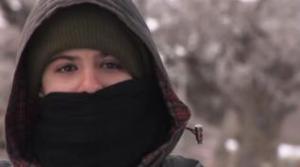
Reply to comment

Angels Die in the Soil is the story of an Iraqi-Kurdish girl who earns a living for her ill father by selling the bones of Iranian soldiers martyred during the Iran-Iraq war. One day she stumbles on a terrorist incident involving an American soldier on her way back home, and she decides to try to help him.
Babak Amini , director of the Angels Die in the Soil, was born in 1978 in the Kurdestan province of Iran. He went to school in Tehran and graduated with a degree in philosophy. Babak worked for 10 years as assistant to director Bahman Ghobadi in his films 'A Time for Drunken Horses', 'Turtles Can Fly', and 'Half Moon'. Amini's Angels Die in the Soil has also appeared in the 16th Archipelago Film Festival in Italy and the 2008 EcoVision Festival as well as the 24th Festroia Film Festival in Portugal, Berlin's Kurdish Film Festival and the 9th Seoul Film Festival. At Palm Springs International Shortfest 2008 Angels Die in the Soil won Cinema Without Borders Best International Film Award
Bijan Tehrani: How did you come up with the idea of the Angels Die in the Soil?
Babak Amini: A friend of mine once told me about a few Iraqi families living on the border of Iraq and Iran who dig beneath the earth to find the remaining bones of the Iranian soldiers who had been killed and buried there during Iran-Iraq war. Then they sell the bones to the family of the soldiers through Red Cross or other contact sources. The money they receive for this operation is very little. To discover the truth regarding this matter I went to the border and I realized that this is happening, but on a very small scale. As I continued my research, I came upon the idea of fictionalizing this concept. I thought a young woman would be great for the main character. The task of digging for bones 6 feet underground in harsh weather conditions of that part of Kurdistan is considered to be a man’s job and having it done by a woman would give it an extra touch. At the same time the issue of the American forces fighting terrorists in Iraq was another issue that interested me and I wanted to know what would happen if the woman of my film confronted terrorists trying to kill an American soldier. I wanted to find out what her reaction would be I wondered if bringing an American soldier to the story would take away from the reality of my story. On the other hand, terrorists were kidnapping and killing American soldiers and were videotaping their executions every week- videos that were posted on the web or were sent through satellite TVs. Therefore, I thought adding this aspect to my story would be a great plus.
BT: You are an Iranian Kurd and you have been working for years as an assistant to a great and well-known Iranian Kurd director, Bahman Ghobadi. Please tell us about this experience and about Kurdish cinema.
BA: I have ten years of experience in Kurdish cinema as assistant director to the internationally known Bahaman Ghobadi. I have worked on Ghobadi’s films such as A Time for Drunken Horses, Turtles Can Fly and Half Moon. Two of his films were shot at border of Iran and Iraq and Turtles Can Fly was shot inside Iraq.
Kurdish cinema is unknown to the world because it is very limited and still in its infancy. Bahman Ghobadi tried hard to introduce the Kurdish cinema to the world, but when you are on your own, there is only so much that you can do. Working conditions for filmmakers in Kurdistan are very hard. Except for a few films, you don’t find the kind of language that attracts international audiences in Kurdish films. There are no film schools, film labs, or even an advanced film camera in Kurdistan. But Kurdistan holds a treasure of untold tales and interesting ideas. I myself was born on the border of Iran and Iraq and I have had a tough life. But I am lucky to be exposed to Kurdistan tales and stories. I have them under my skin. But when you want to tell your stories you always face limitations and challenges. Despite all these problems there are a few good Kurdish filmmakers around and there are a few Kurdish film festivals held in countries such as Germany, England, and the US.
BT: You have made a brave and bold choice by bringing in the character of the kidnapped and injured American soldier to your film, what has been the reaction of the audiences to this matter?
BA: I have seen so many different reactions to the film and especially to the American soldier character in the film. Once I was watching Angels Die in the Soil with a family that had lost two of their sons to Iran/Iraq war. The mother in the family was crying while watching the film; she had never had a similar experience watching typical war movies. This particular family had never seen the bodies of their lost sons and they were touched to know that on the other side of the border there are people who help to find the remains of the Iranian soldiers killed in Iraq. When I was traveling with my film in Europe, I met a couple at an Italian film festival who both cried watching the scenes showing the terror of the American soldier and the Kurdish girl helping him to survive. In Q&A session following the screening I learned that this couple has a son serving in Iraq. They worry about him constantly and see their own son in the American soldier character in the film.
BT: How did you find the girl that plays the main character, she has a great performance, is she a professional?
BA: I was looking for someone that has an understanding for this part, someone that has experienced the war and its tragedies. And I did a long search in the area in which the story happens and I found a young girl who dismantles land mines with her younger brother. This girl had lost her entire family in the war and it was hard to get the right performance from her. She did not want to talk because she was accustomed to living in silence. But it finally worked well and the rest of the actors in the film are locals.
BT: You are a graduate of Philosophy, how has this helped you in your career as a filmmaker?
BA: I was about to go to film school when Ghobadi told me that you can always learn filmmaking by working as an assistant, but studying philosophy is very important for a filmmaker. My knowledge of philosophy helps me to find new layers in every subject that I deal with.
BT: You have been selected to go to Cannes for writing the script of your first feature film, this sounds great!
BA: The Cannes Film Festival is holding a program called “Cine Foundation”, every year six filmmakers are selected to take part is this program. Filmmakers send their short films along with the synopsis of their first feature film script to the Cine Foundation selection committee. If a filmmaker’s quality of work and ideas appeal to the committee members and the French film producers, then the filmmaker is considered for this program. This year there were so many entrees that ten filmmakers were selected in the first round and I was one of them. We all went to France for an interview with the director of the Cannes Film Festival and five committee members. After everyone had been interviewed, 4 filmmakers were eliminated from the list. I was lucky enough to be among the selected six. In the Cine Foundation program’s 17 years of existence, I am the first Iranian and Kurd filmmaker to be selected to attend it. Attending this program will change the direction of my life. I will have the opportunity to learn more about professional filmmaking and the film industry of France. This program runs between October and February of the next year at the Cannes festival office in Paris.
BT: Any ideas that you are working on right now?
BA: I wanted to make more short films, but now I have to go to France for the Cine Foundation program that will lead to the making of my first feature. I am working on two feature film ideas, one is for the Cannes program and it is about oil in Kurdistan. The other feature film idea is about a beautiful young Iranian Kurd woman that escapes Iran with her little son and ends up trying to make a life for herself in Turkey in the fashion business. I hope I can work on both scripts in France and then find European and American producers interested in those subjects to make them.
BT: Is it true that you’re going to submit “Angels Die in the Soil” for the Academy Awards Best Short Film Award?
BA: After winning the Award of your publication, Cinema Without Borders at the 2008 Palm Springs ShortFest International Film Festival, a few friends advised me to have the film considered for the Academy Awards and it would be great if my film gets a chance to participate at the Oscars.
- Add new comment
- 5915 reads


